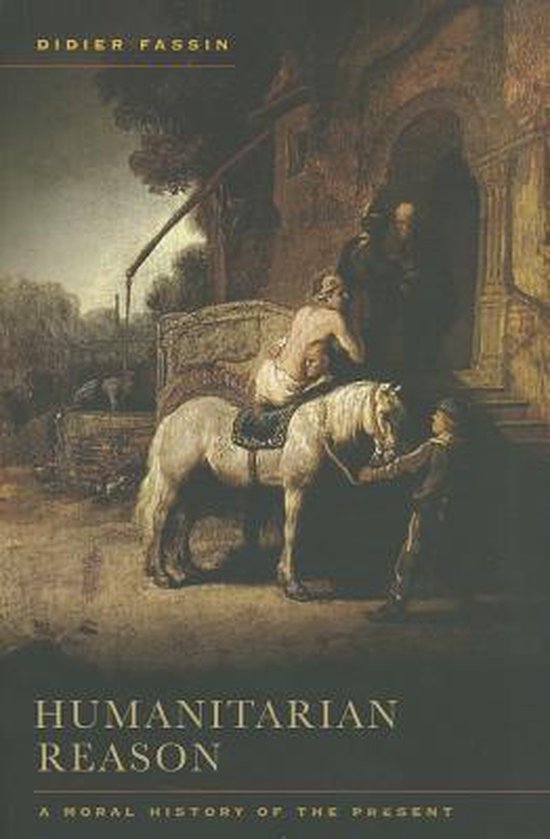
Humanitarian Reason
In the face of the world's disorders, moral concerns have provided a powerful ground for developing international and local policies. This title draws on case materials from France, South Africa, Venezuela, and Palestine to explore the meaning of humanitarianism in the contexts of immigration and asylum, disease and poverty, disaster and war.
“This is a field-defining volume. Based on ten years of comparative field research and a unique combination of medical and anthropological expertise, Didier Fassin’s Humanitarian Reason avoids moralizing in favor of careful sociological analysis. Humanitarianism emerges both as a form of reason and as a key force in the contemporary arts of government. “ --Claudio Lomnitz, Columbia University, author of Death and the Idea of Mexico
"This is a rigourous, principled, and compelling account of the emergence of humanitarianism and of what happens when humanitarianism is put into practice. Through a tour of various humanitarian projects in France and elsewhere, Didier Fassin develops a compelling case for a sea change in our social imaginary, one in which an ethics of suffering and compassion has come to displace a politics of rights and justice. Fassin moves with finesse between constructionist and realist arguments in this major transatlantic work of 'ethnographic reason' from one of the most interesting voices writing today." --Michael Lambek, University of Toronto; editor of Ordinary Ethics: Anthropology, Language, and Action
“The rise of a field of humanitarian action accompanies cultural transformations in the category of the human and the idea of responsibility. In this important book, Didier Fassin addresses the nature of obligation to strangers and solidarity amid inequality, and connects these themes to the question of whether to think of global moral community as an attractive ideal, a problematic fantasy, or both.” --Craig Calhoun, President of the Social Science Research Council and author of Nations Matter
In the face of the world's disorders, moral concerns have provided a powerful ground for developing international as well as local policies. Didier Fassin draws on case materials from France, South Africa, Venezuela, and Palestine to explore the meaning of humanitarianism in the contexts of immigration and asylum, disease and poverty, disaster and war. He traces and analyzes recent shifts in moral and political discourse and practices - what he terms "humanitarian reason" - and shows in vivid examples how humanitarianism is confronted by inequality and violence. Deftly illuminating the tensions and contradictions in humanitarian government, he reveals the ambiguities confronting states and organizations as they struggle to deal with the intolerable. His critique of humanitarian reason, respectful of the participants involved but lucid about the stakes they disregard, offers theoretical and empirical foundations for a political and moral anthropology.
“This is a field-defining volume. Based on ten years of comparative field research and a unique combination of medical and anthropological expertise, Didier Fassin’s Humanitarian Reason avoids moralizing in favor of careful sociological analysis. Humanitarianism emerges both as a form of reason and as a key force in the contemporary arts of government. “ --Claudio Lomnitz, Columbia University, author of Death and the Idea of Mexico
"This is a rigourous, principled, and compelling account of the emergence of humanitarianism and of what happens when humanitarianism is put into practice. Through a tour of various humanitarian projects in France and elsewhere, Didier Fassin develops a compelling case for a sea change in our social imaginary, one in which an ethics of suffering and compassion has come to displace a politics of rights and justice. Fassin moves with finesse between constructionist and realist arguments in this major transatlantic work of 'ethnographic reason' from one of the most interesting voices writing today." --Michael Lambek, University of Toronto; editor of Ordinary Ethics: Anthropology, Language, and Action
“The rise of a field of humanitarian action accompanies cultural transformations in the category of the human and the idea of responsibility. In this important book, Didier Fassin addresses the nature of obligation to strangers and solidarity amid inequality, and connects these themes to the question of whether to think of global moral community as an attractive ideal, a problematic fantasy, or both.” --Craig Calhoun, President of the Social Science Research Council and author of Nations Matter
In the face of the world's disorders, moral concerns have provided a powerful ground for developing international as well as local policies. Didier Fassin draws on case materials from France, South Africa, Venezuela, and Palestine to explore the meaning of humanitarianism in the contexts of immigration and asylum, disease and poverty, disaster and war. He traces and analyzes recent shifts in moral and political discourse and practices - what he terms "humanitarian reason" - and shows in vivid examples how humanitarianism is confronted by inequality and violence. Deftly illuminating the tensions and contradictions in humanitarian government, he reveals the ambiguities confronting states and organizations as they struggle to deal with the intolerable. His critique of humanitarian reason, respectful of the participants involved but lucid about the stakes they disregard, offers theoretical and empirical foundations for a political and moral anthropology.
| Auteur | | Didier Fassin |
| Taal | | Engels |
| Type | | Paperback |
| Categorie | | Mens & Maatschappij |